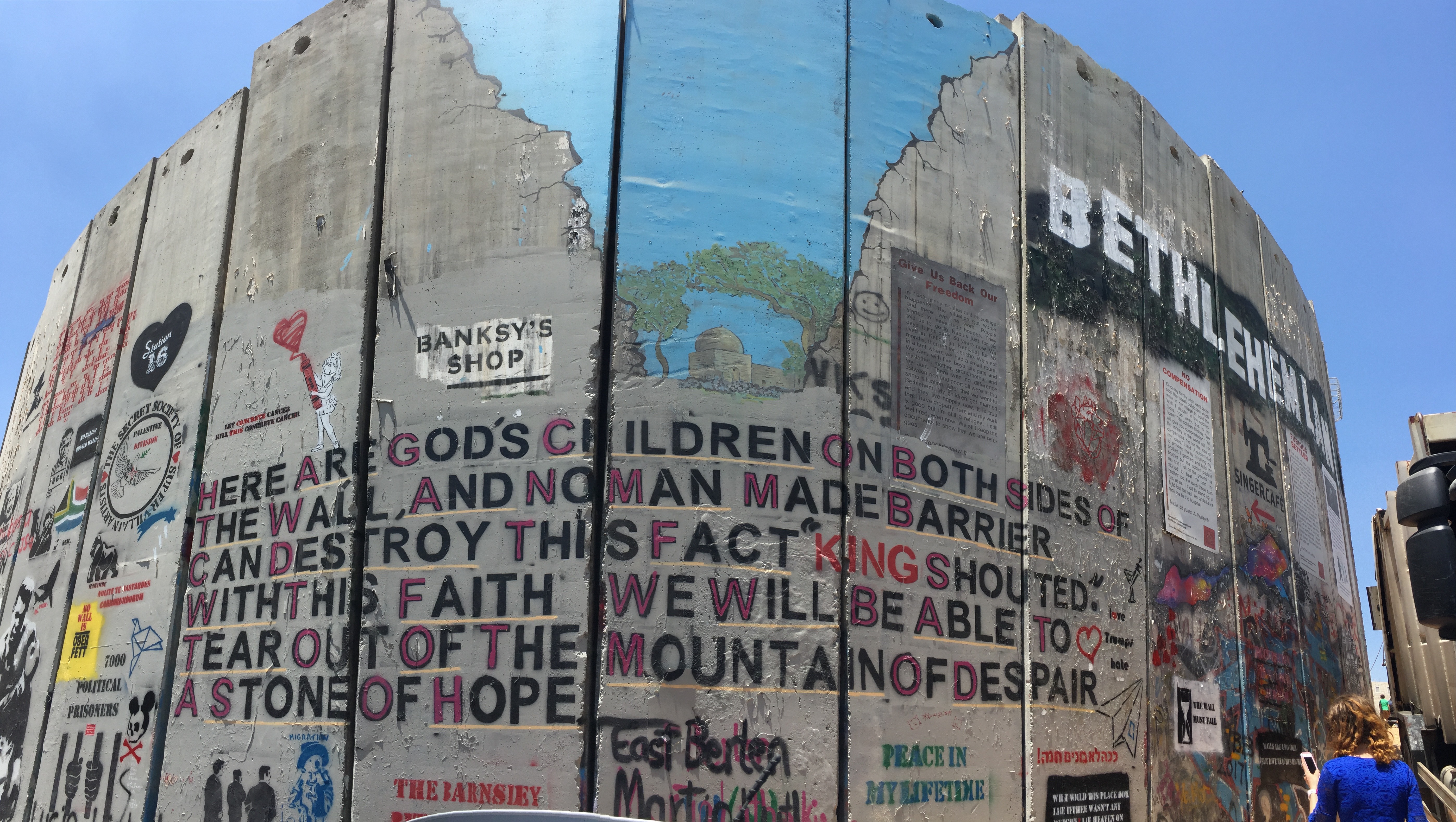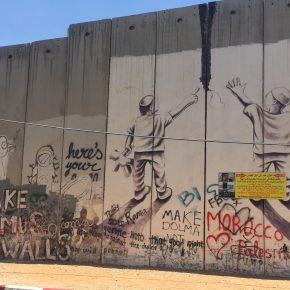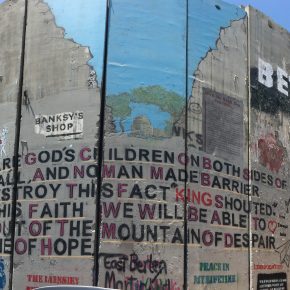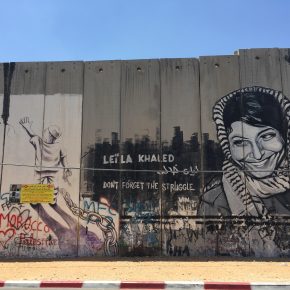
By Noora Reffat
[divider]
[dropcap]W[/dropcap]e stood in line talking softly amongst ourselves, occasionally cracking jokes at each other as we shuffled nervously. A row of twenty-something-year-olds holding tightly onto their American passports, hoping the little blue books would be enough to let them pass smoothly into Israel. There were fifteen of us in total, all of us students from different universities, studying different things, but brought together in Ben Gurion Airport by our common desire to learn more about the world firsthand. Our goal was to enhance our understanding of the Israel-Palestine conflict; our fear was that the border control agents would not allow all of us to do so.
Of our group, I was third in line to walk up to the border agent. Short with a dark tanned face, almond eyes with dark pupils, and a hijab framing my face. My Egyptian ethnicity and Islamic faith immediately identified me as an individual that Israel may have concerns about. The airport is known to use racial profiling as a form of security screening, and even more so known for its hard stance on allowing Palestinians into the country. Though not Palestinian, I checked off all the boxes needed to put them on edge. Read: I was Arab and this was Israel.
It was soon my turn and I walked up to the gate. The women behind the glass stared at me for a moment before motioning for me to hand her my passport. I slid it under the glass, along with a pamphlet including details about the program I was doing. The officer ignored the pamphlet, grabbing my passport and glancing at my name briefly and then at my face. She made a remark to the officer in the booth adjacent to hers, and the man inside looked over at me for a moment before making a comment in Hebrew. She responded and then looked back at me.
“Go to the white office,” she said to me in English. I blinked hard, my heart dropping slightly. I knew exactly what that meant.
I was being detained.
I nodded quickly and softly asked for my passport back but the officer shook her head. “We keep this,” she said. “Go to the office.”
I nodded again, my face flushing with embarrassment; my nerves and heartbeat quickly speeding up. I grabbed my suitcase and began walking back, past all my friends in line, each of them looking shocked and confused as I dragged my suitcase to a small white office situated in the corner of the large room. The professor accompanying us on our trip immediately grabbed his backpack off the floor, muttering to the others to stick together as he accompanied me over to the detention office.
The office was barren, with dark grey metal chairs lining the walls and a muted T.V. hanging in the back. A water cooler stood in the corner with a long, crusty streak running down the side, evidence of how long it’s been since the fridge has been cleaned. The office only had one door, which was flanked on both sides by scowling airport security. I picked a seat in the far corner of the room, away from the three other people it contained: two dark-skinned men and a skinny Frenchman with tattoos lining his arm. He smiled at me as I sat down. I grimaced back at him.
I had been in the room for less than five minutes when I heard another person enter. I looked up and smiled briefly, unsurprised and slightly amused at who I saw. It was another student from our trip, also Arab and also Muslim. Brown skinned, like me, with a dark beard and a Yemeni identity attached. He had just sat down next to me when another person entered the room, another Arab man, another student from our group. Palestinian, this time. A few seconds after him, a female entered. Another student from our group. Another Palestinian. We all sat in a row in the corner together, feeling like the butt end of a bad joke: “Four Arab-Americans walk into an Israeli airport…”
Looking back at it, none of us were all too surprised to find ourselves in that room together. We had all heard the horror stories of being racially profiled in Israel, had all read the articles about “flying while Arab,” and had experienced our own forms of racism both at home and abroad. The Palestinians in our group had been warned ahead of time that there may legal issues getting through Ben Gurion, and the Muslims had been warned that there may be religious ones. Being detained was always the reality of our visiting Israel, and the only real question we had at the time was for how long.
As the minutes dragged on, the question of “how long” became our focus. The TV in the room was playing a somewhat engaging soccer game, and it drew our attention occasionally as we continued to wait to be called for questioning. Every so often, someone would make a comment regarding the game, but it was often forced and merely an attempt to distract ourselves. The game drifted from my mind as the time continued to pass, and when my eyes drifted to it again some hours later, I realized that the same game was still playing, pre-recorded and playing on a loop. I sighed deeply. There were no clocks in the room, so the infinite game became my clock. I tracked time by the number of times I’d seen certain plays. It was an imperfect system, but a needless one. I had access to my cell phone and was wearing a watch, but the added challenge of using the game to tell time helped it pass.
The waiting room soon became a liminal space. We were all somewhere in the in-between, with no control over which side of reality we were going to end up on. No control over what questions the officers were going to ask us. No control over which pieces of our history they were going to scrutinize. No control over what judgments they were going to make. No control over when they were going to give us our passports back. No control over when we would receive our visas, or when they were going to decide to deport us back to Jordon. It was clear that the control of the space lay fully in the hands of the Israeli security that flanked the only exit to the room, and the only thing we could control was how we were going to pass the time as the minutes ticked on.
In total, our detention lasted six hours. It was only after many visits to the back office and seeing many people come and go that we received our passports and visas around 4 a.m., the last people to leave the detention office that night. We each trudged out, exhausted, our luggage in tow and our eyes drooping as we once more approached the agents behind the passport control booths, our new visas clasped tightly in hand, our hearts hopeful this time we wouldn’t get sent back. The agents didn’t spare us a glance this time around, briefly glancing at our passports before waving us forward. We walked through quickly, thinking that if we moved fast enough they wouldn’t have the chance to change their minds.
In all honesty, the remainder of that night is somewhat blurred. We reunited with our peers at baggage claim, exhausted and sullen as we checked in with each other, quiet hugs and are you okay’s being exchanged as everyone tried to come to terms with the happenings of a long and unjust night. We were quickly ushered out of the airport, students eager to leave after sitting around for hours and professors feeling guilty that our driver had to wait so long to drive us to our hotel.
Reflecting on this experience some days later, one of the boys who had been detained with me read aloud the first page of his American passport.
The Secretary of State of the United States of America hereby requests all whom it may concern to permit the citizen/national of the United States named herein to pass without delay or hindrance and in case of need to give all lawful aid and protection.
I echo here his disappointment that this passage seem to only protect those whom are white, and his frustration that our nationality was doubted due to our ethnicity. I will not deny that I entered Ben Gurion with my own prejudices and apprehensions about Israel, but I made a promise to myself as I walked off the plane that I would keep an open mind. It is unfortunate that those six hours in detention gave me all the confirmation I needed that perhaps an open mind was too generous a thing to offer a government so oppositional to my personhood. And as I think of all those who continue to be delayed and hindered at the hands of Israel due to their ethnicity, I cant help but wonder at the power of color, and how the perception of a place can be so quickly dulled by their treatment of your own.
[hr]
Noora is a Junior in Berkeley College majoring in Anthropology. You can contact her at noora.reffat@yale.edu.


